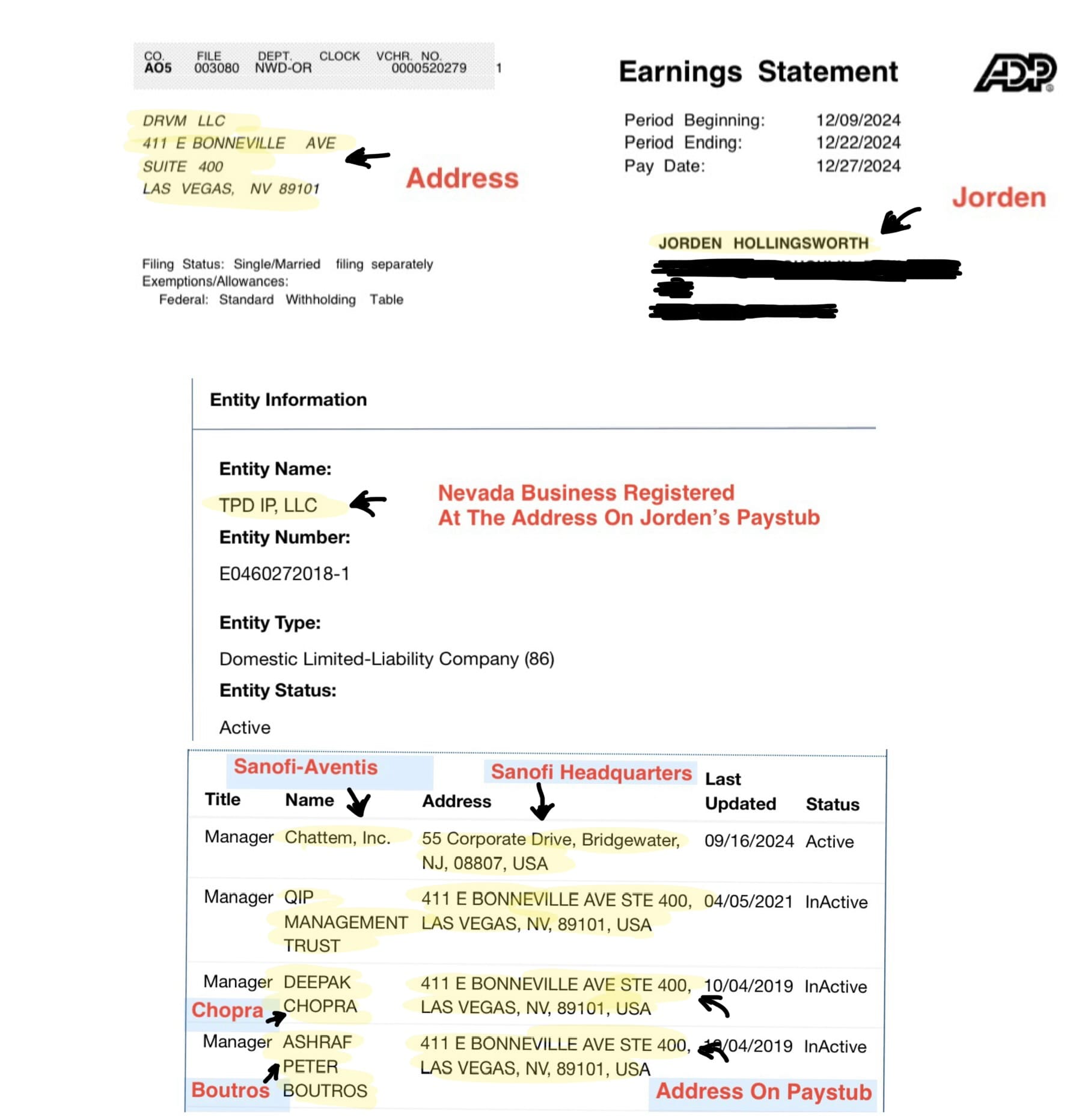Evidence #1 - My Paystub, a Shell Company, and a Billion-Dollar Question
This is where it starts. One paystub. One address. And one discovery that opened the door to a massive corporate network hiding in plain sight.
In October 2024, I worked briefly inside a Costco location, handing out product samples for a company called DRVM LLC. These weren’t food samples from Costco’s in-house team, they were for a supplement vendor operating inside Costco.
The address on my paystub caught my attention:
411 E Bonneville Ave, Suite 400, Las Vegas, NV 89109
I decided to look it up. What I found stunned me.
This single Las Vegas address has over 100 companies registered to it, most of them shell companies. These shells are not random; they are interconnected, sharing the same managers, trusts, and corporate ties.
One example is TPD IP LLC, a Nevada-registered company at the exact same address. On paper, its “managers” include:
• Sanofi-Aventis, a $120 billion global pharmaceutical giant, through its U.S. subsidiary Chattem Inc. (registered at Sanofi’s New Jersey headquarters)
• Ashraf Peter Boutros, tied to multiple other companies at the same address
• Deepak Chopra, also connected to these same corporate entities
• A management trust, which acts as a private control mechanism for multiple shells in the network
And this is just one shell company. I have dozens more to show in this series.
The Problem With My Paystub
The paystub itself raises a legal red flag: DRVM LLC was dissolved in Oregon at the time it paid me.
That means:
• It had no active business license
• It should not have been employing anyone
• It raises serious questions about tax reporting, payroll legality, and financial compliance
So how was I being paid?
Where were the taxes going?
Who was actually my employer?
When a dissolved company issues paychecks, it isn’t just a “clerical error.” It’s a potential violation of state and federal labor laws, and a possible indicator of deeper financial concealment.
Why This Matters
Sanofi is a publicly traded corporation. Public companies are legally required to report:
• The number of employees they have
• Their total payroll
• Their revenue and expenses
If Sanofi is hiding employees behind inactive shell companies, it is misleading regulators, shareholders, and the public, and shielding itself from legal and financial accountability.
This isn’t just about my paycheck. If this network is as large as the evidence suggests, employees across the country are working for a company they think is independent, when in fact they’re working for one of the largest pharmaceutical corporations in the world, without access to benefits, legal protections, or the ability to hold their real employer accountable.
Why Shell Companies Like This Exist
This setup isn’t just about concealing a line of employees.
Money can flow through these shells into trusts and foundations, further distancing it from oversight.
The people most affected?
Older workers and lower-income individuals who take these vendor jobs inside stores like Costco, with no idea their labor is feeding into a global corporate structure that’s insulated from lawsuits and accountability.
This Is Just the Beginning
This paystub was my starting point. From here, I began tracing shell companies, trusts, and corporate officers — uncovering a network tied to Sanofi, Boutros, Chopra, and others.
In the next posts, I’ll show you how these shells connect to each other, how they’re spread across multiple states, and how they were suddenly re-registered in bulk right after I filed my first complaint.
This is Evidence #1. The tip of the iceberg.
